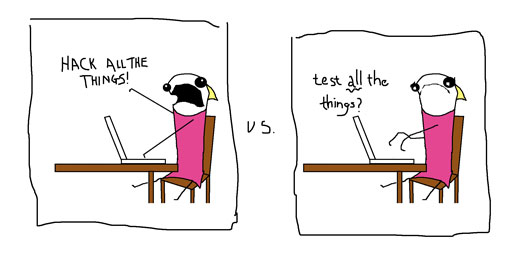
Writing a slick iPhone app is exciting. Building a communication tool that changes how people communicate is stimulating. Hacking ((cracking)) into a bank’s security system to pull of a heist is the stuff of Hollywood. “Liberating” information from classified sources can lead one to be hailed a hero. Writing test cases for code is sexy. Wait… what?
Continue reading “Testing is sexy”
In defence of climate change deniers
I’ve heard some people say they don’t understand how people can hold the view that climate change is not anthropogenic yet claim that climate change can be countered cheaply using geo-engineering, e.g., by injecting sulfur ((Why, IUPAC, why?)) into the atmosphere. The reason for their concern is that they think it’s logically inconsistent since the effects of geo-engineering techniques and anthropogenic climate change are predicted by the same computer models. However, (anthropogenic) climate change deniers are being perfectly reasonable as far as thinking about temperature goes. Let me explain.
Ultrabook fad
Hello, Inflo
And now for something completely different: the post that I’ve alluded to for a few weeks (and as far back as last year)…
Peddling an idea
The Bill and Melinda Gates Foundation is a charitable organization that has laudable goals including improving healthcare and reducing extreme poverty. One of its current fights recently suffered a setback when it was announced that a polio outbreak had struck Tajikistan, a place that had previously beaten back the disease. With an infusion over the last two years of more than half a billion dollars and a world-wide expense of nearly $10 billion USD, polio has yet to be beaten. Success in this campaign is far from guaranteed; so far, humanity has managed to use its skills to eradicate exactly one disease: smallpox. Regardless of whether we manage to vanquish polio, we will certainly face other diseases. Is there are more sure-fire way of saving lives? Perhaps even one that could also help reduce poverty at the same time?
More on Paper vs. Screen: The Creative Process
I thought that, as a reasonably quick reader and a user of a laptop that sips 8W of power while in use ((With the screen turned low and with wi-fi turned off.)), it would almost always make sense for me to work with content electronically (To Print or Not to Print?). While sitting in a meeting, it struck me that, on an almost daily basis, there are pages of text with which I spend more than an hour. I was, of course, thinking about writing my depth paper.
Continue reading “More on Paper vs. Screen: The Creative Process”
iPad? How bad?
Update: So it looks like my estimates for the carbon dioxide emissions were way off. I guess iPad’s components must be particularly carbon-unfriendly per unit mass; if I had to speculate, it’s due to a higher component weight to frame weight than on the computers considered here. Updated results at the end of this post; you can follow along using the original text, substituting in the new values for manufacturing. It looks like my estimates for power adapter efficiency and power consumption are pretty much spot on, though.
Jorge Aranda tells me his brother is considering one of those newfangled iPads to reduce his environmental footprint:
His reasoning is that it will help him pay for “content” without damaging the Earth –specifically, he’s talking about reading the newspaper, magazines, and e-books in the iPad, instead of buying them in paper version.
I suspected, and told him, that on the whole this would probably mean an *increase* in environmental damage, rather than a decrease. He’s not convinced.
Jorge then adds the question that prompted the creation of this blog: “Who is right?”
So will buying an iPad to replace print materials reduce carbon emissions or just result in more iWaste?
To Print or Not to Print?
During the summer, I was musing on Vannevar Bush’s ideas presented in his paper As We May Think. Having the attention span of a… where was I? Oh, yes. So my mind wandered to thinking about by how much our carbon footprint could be reduced by switching to a paperless office. The answer surprised me and I mentioned it idly to my research supervisor, Steve Easterbrook. He suggested I publish it on a blog and we discussed the creation of a software tool to help present the argument more clearly. I’ve finally worked up the nerve to start up this blog to do the former and the latter is in the works. So here is my first post detailing how much carbon dioxide is emitted by reading a page of text on a computer instead of printing it out. Ladies and gentlemen, start your stopwatches!
